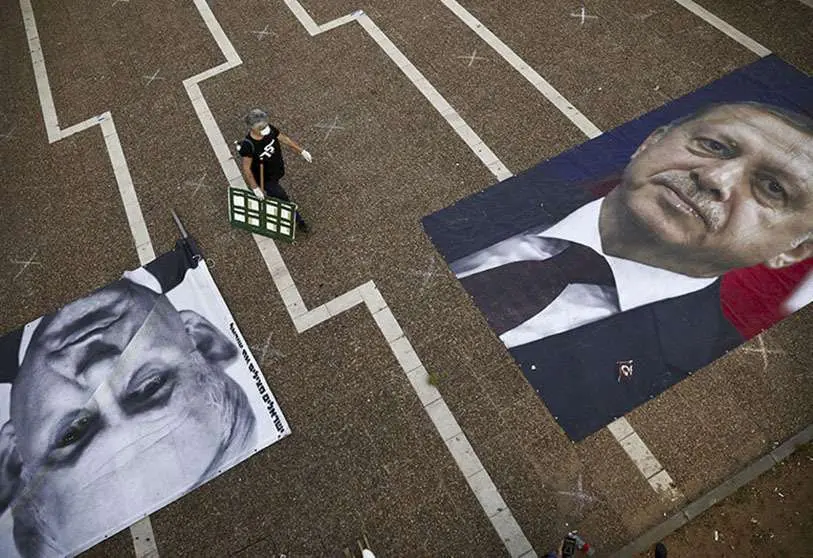Turkey seeks diplomatic rapprochement with Israel in the face of isolation

A Turkish diplomatic delegation reportedly met with Israeli counterparts, according to the daily Israel Hayoum, to discuss issues related to the security environment in the region, especially with regard to the situation in Syria and Libya. These meetings have reportedly been repeated on other occasions recently. However, according to the sources, the novelty with respect to the last meeting is the possibility of resuming the contact lost in 2010, which included the withdrawal of the diplomatic representation of both countries.
Relations between Turkey and Israel were frozen in 2010 following Israel's violent raid on a Turkish aid ship called the Mavi Marmara, in which at least ten people were killed. The Mavi Marmara was part of the First Freedom Flotilla and was on its way to Gaza when it was attacked by Tel Aviv. The bloody event led to the withdrawal of diplomatic envoys on both sides, dealing a serious blow to bilateral relations. After several years of diplomatic absence, in 2016 the two countries announced the 'normalisation' of their diplomatic relations. However, Turkey and Israel have not had ambassadors in each other's capitals since the US moved its embassy from Tel Aviv to Jerusalem in May 2018, leading to mass protests by Palestinians.

In recent weeks, however, Erdogan has adopted a markedly different tone towards Israel, expressing his interest in improving relations with his former ally. This shift is driven by global and regional changes that have put Ankara between a rock and a hard place: isolated from Europe and many Arab states, it faces a potentially hostile White House, while its economy continues to be shaken by the pandemic. Opening a new chapter with Israel could help restore Western confidence and re-establish a fruitful military relationship with NATO.
It is only now, despite this cooling of relations, that efforts are being made to resume them through continued low-profile meetings between the two sides, which are now seeking to raise their profile. At this latest meeting, the possibility of having diplomatic representation in both countries again was discussed, which would bring Ankara and Tel Aviv closer together.

Already during the first wave of the coronavirus, the two countries maintained contacts due to Israel's need for medical supplies, which Turkey tried to alleviate by sending protective equipment for its health workers. This gesture, which was welcomed in Israel, would have made possible the current meetings to re-establish relations between Ankara and Tel Aviv. However, the level of relations between the two countries is unlikely to be fully amicable, given Erdogan's attitude to many of the conflicts in the region and his growing ties with Tehran. The latter is of great concern in Israel, which has an almost constant struggle with Hezbollah's military wing along the Blue Line with Lebanon and with Hamas in the Palestinian territories, both of which are supported militarily and financially by Iran.
Recently, however, there have been positive signs of rapprochement. Israel's decision not to sign a statement by France, Greece, Cyprus, the United Arab Emirates and Egypt condemning Turkey's actions in the eastern Mediterranean raised hopes. Israel's statements on social media praising its diplomatic relations with Turkey further fuelled optimism. Turkish analysts saw the moves as a sign of the two countries' willingness to cooperate on issues such as the energy sector in the eastern Mediterranean.

Turkey seeks to improve its relations with Israel, especially after straining relations with many neighbouring countries. Israeli officials announced in mid-December that Israel and Turkey had reached a series of 'understandings' to normalise relations after secret negotiations in Switzerland. A Turkish official had earlier announced that there had been "progress" towards a "framework agreement" between the two countries, while stressing that no agreement had yet been signed.
Erdogan may be taking advantage of this seemingly contradictory strategy of rapprochement with Israel on the one hand, and diplomatic attacks on the other, to further his expansionist and economic goals in the Mediterranean and the Middle East.
Thus, the desire to counter Turkey's influence in the region has created the perfect breeding ground for the emergence of an alliance between Cyprus, Egypt, Greece and Israel. Against this backdrop of uncertainty, tensions are likely to continue to rise and the geopolitical map may change completely in just a few months' time. Turkey and Israel are determined to defend their interests, even if this means turning the agreements signed in recent years into a dead letter.










